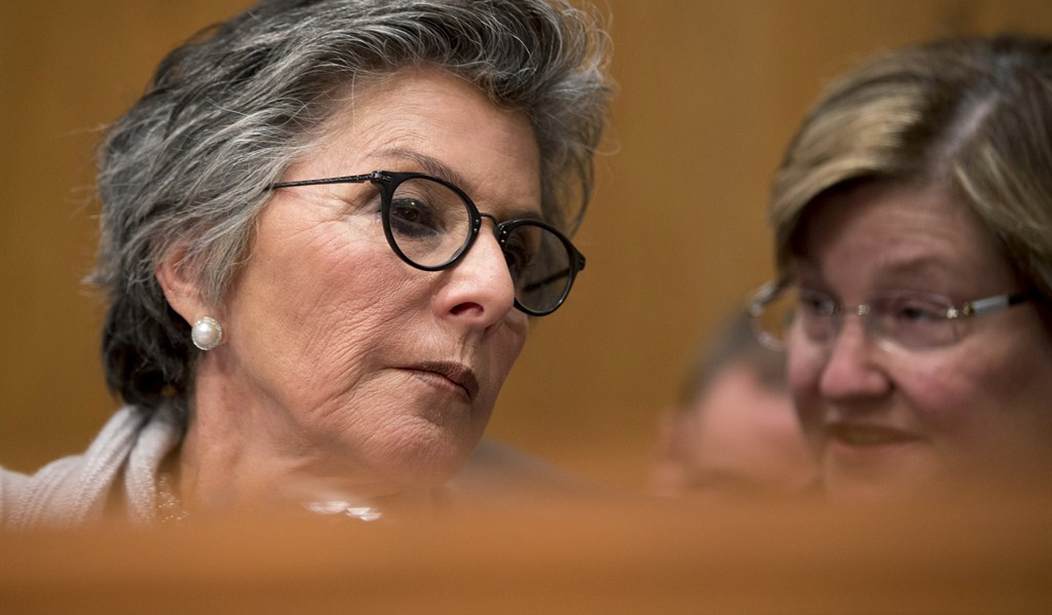As many expected, California's junior US Senator, Barbara Boxer, has announced she will not seek re-election in 2016. When she departs, the Congress will lose of one its most obnoxious, reflexive Leftists. Boxer made her intentions official in a
Advertisement
"I am never going to retire. The work is too important. But I will not be running for the Senate in 2016."
We discussed the political implications of this decision a month ago when these rumors began to circulate in earnest. One thing is assured: Boxer's formal announcement touches off a frenetic contest among ambitious California Democrats -- including, perhaps, billionaire Tom Steyer, who is said to be eyeing the seat. Between President Obama's long-delayed veto threat on the Keystone Pipeline (an outcome for which Steyer has invested heavily) and Boxer's decision, the deep-pocketed power player must be enjoying his week. Republicans should be under no illusions about the likelihood that this seat will be filled with someone less hostile to conservative values, let alone by a Republican. The California GOP has effectively been reduced to a regional party in the state; Republicans haven't really sniffed either US Senate seat in decades. But wait, is there an unusual scenario that could pave the way to an upset GOP victory?
The field of potential Democratic candidates for Boxer's slot is large, possibly going beyond obvious prospects like Lt. Gov. Gavin Newsom, state Attorney General Kamala Harris, state Treasurer John Chiang, Los Angeles Mayor Eric Garcetti and his predecessor Antonio Villaraigosa. Less obvious might be Silicon Valley moguls like Facebook chief executive Sheryl Sandberg and billionaire hedge fund operator Tom Steyer, of late a financial angel for liberal causes...They and the rest of the large possible field would be well advised to heed what happened in 2012 in the 31st Congressional District in San Bernardino County, a district where Democrats have a solid voter registration advantage and one where President Obama twice won by healthy margins...Almost four times as many people voted in the November runoff that year as in the primary. This and the plethora of Democrats splintering their party's vote allowed [Republicans] Miller and then state Sen. Bob Dutton to finish first and second in the primary. Democrat Pete Aguilar of Redlands, the preferred candidate of his party's leaders, finished third with just 23 percent of the vote...If at least some Democratic prospects to succeed Boxer don't stifle their ambitions, precisely the same thing could happen in the Senate primary, even though no Republican has yet expressed interest in running. One thing for sure: If one and only one Republican makes this race, he or she is almost certain of a runoff slot. And if a slew of Democrats get in against two Republicans, both Republicans could advance to November, guaranteeing the GOP an improbable Senate seat for six years.
Recommended
Advertisement
A lot of pieces would need to slot into place for this to play out properly: Namely, a crowded Democratic field packed with prominent names on one side, with two -- and only two! (good luck with that) -- solid Republicans running on the other. If the primary electorate is sufficiently fractured, it's conceivable that the Democratic vote would splinter so badly that the last two candidates standing would be from the opposite party, guaranteeing a GOP victory in the run-off/general election. These are the perils of a "jungle primary" system, which California implemented in 2012. While plausible, this result is still far-fetched. One big reason mentioned in the column quoted above is that two plum California jobs are likely to open up in four years: The governorship and Dianne Feinstein's Senate seat (she's currently 81 years old). If the state's up-and-coming Democratic players get together and iron out a backroom gentlemen's agreement, they could engineer a deal in which everyone is guaranteed their "turn," while all but guaranteeing that Republicans get shutout in each major race. Such is the sorry state of Republicanism in California today. Parting thought: Even though political honorifics tend to follow politicians for the rest of their lives, long after they've ceased serving in that capacity (see: Senator Santorum, Governor Romney, etc), will it be more acceptable to refer to Boxer as "ma'am" after she hangs it up?
Advertisement

























Join the conversation as a VIP Member